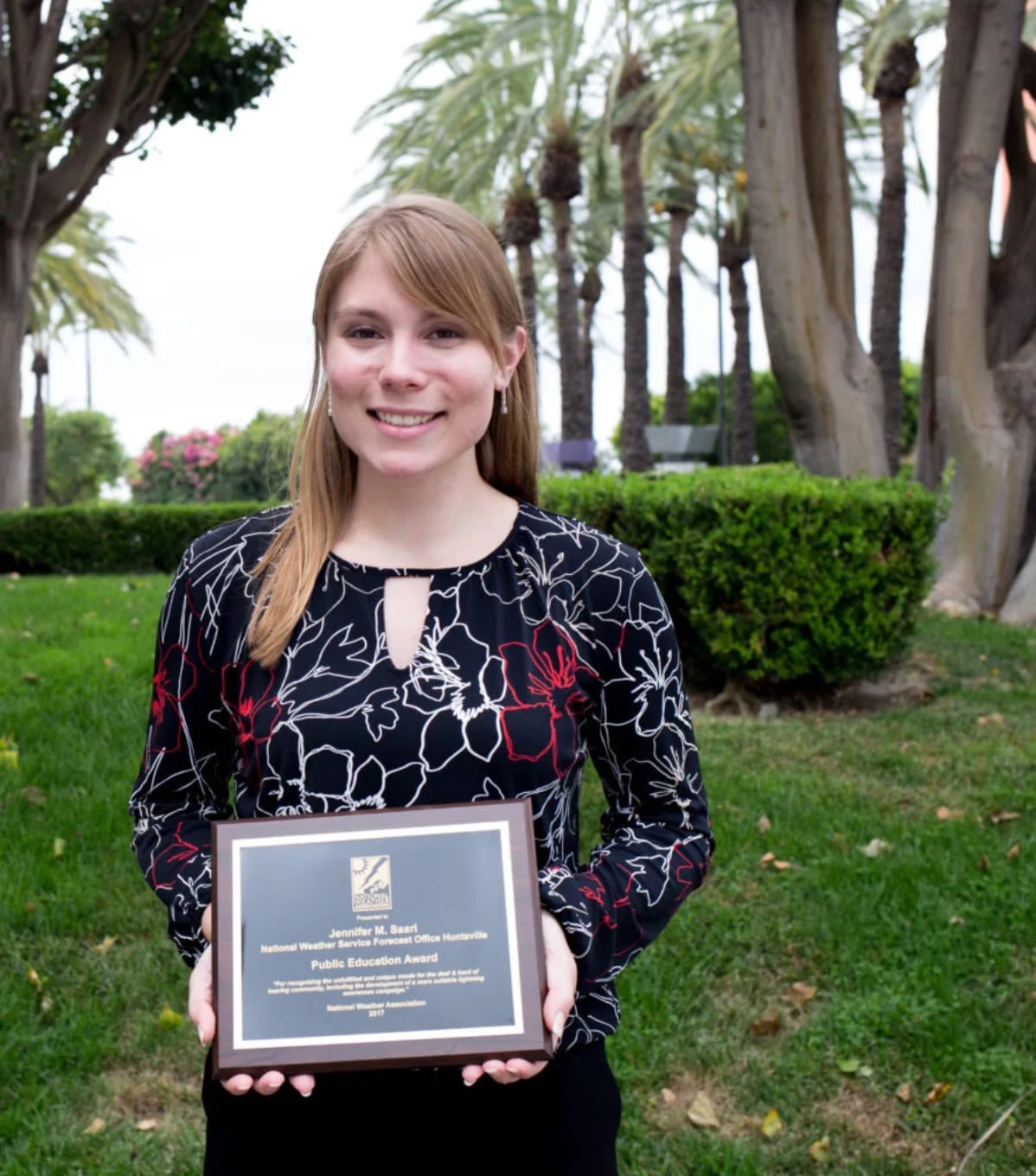Top Stories
Tornado Survivor Turns Tragedy into Meteorology Mission

On August 28, 1990, an F5 tornado devastated parts of Plainfield, Illinois, leaving a lasting impact on families and communities. Among those affected was Jennifer Saari, who, although not in Plainfield at the time, has dedicated her career to meteorology, driven by the memories of destruction and loss experienced by her family during that catastrophic event.
At just two and a half years old, Saari was living in nearby Joliet when the tornado struck. While her family sought refuge in their basement, her great-grandparents and great-aunt were exposed to the full force of the storm. “I remember my mom trying to call them after the storm passed, and all she heard was, ‘Hello?’ and a click,” Saari recalled. This moment marked the beginning of her journey into understanding severe weather.
Witnessing the Aftermath
Saari vividly remembers the chaotic trip to check on her relatives. “We were trying to get around all the downed power lines, which looked like a giant had torn through them,” she said. Upon arrival, she and her mother found her great-grandparents in their basement, experiencing minor injuries. Just a few doors down, her great-aunt and uncle were in a similar situation, having narrowly escaped serious harm.
Her great-grandmother’s account of the tornado’s approach was striking. “She said the sky was ‘green like she’d never seen,’” Saari noted. Fortunately, her great-grandfather had just moved to check a flickering lamp when debris fell on him, protecting him from more severe injuries. The tornado ultimately claimed 29 lives and injured 353 others, making it the only F5 tornado to hit the United States in August.
Following the tornado, assessments revealed that Saari’s great-grandparents’ home suffered F3-level damage, while her great-aunt and uncle’s property sustained F2-level damage. In the aftermath, Saari’s parents purchased the cleared land and built a new home, fostering a sense of resilience amidst the destruction.
A Career in Meteorology
Growing up on land scarred by the tornado, Saari felt a strong calling. “Hearing the stories from my family, I decided that one day I wanted to be a meteorologist,” she explained. “I wanted to make a difference for people the next time.” In 2011, she took a significant step toward that goal by moving to Huntsville, Alabama, to work as a meteorologist with the National Weather Service (NWS).
On her orientation day, severe weather struck Alabama, resulting in over 250 fatalities across the southeastern United States. “It was like a marching band of Plainfield tornadoes came through one after another,” Saari recalled. This experience solidified her commitment to community preparedness, as she recognized the urgent need for effective communication during severe weather events.
Saari’s role with the NWS extends beyond forecasting; she leads the National Deaf and Hard of Hearing Outreach Team. Her involvement began after she met deaf survivors of tornadoes who expressed the need for more accessible weather information. “I wanted to ensure everyone had the resources they needed,” she said.
In the weeks following, Saari collaborated with statewide disability services to create storm preparedness materials tailored for the deaf and hard of hearing. This included initiatives to provide “bed shaker” weather radios, which vibrate and flash to alert users to severe weather warnings during the night. Her efforts have since influenced similar outreach in NWS offices nationwide.
Saari’s work has also earned recognition, including an award in 2017 for developing inclusive slogans for weather preparedness campaigns. “You need to be weather ready,” she emphasized. “Even with advancements in technology, a perfect warning is ineffective if people don’t know what to do.”
Reflecting on her family’s experience, Saari noted the importance of education in weather preparedness. “My Nana didn’t know who to call when she found giant hail on the ground,” she said. Today, schools and emergency management agencies actively promote weather preparedness, helping communities understand how to report severe conditions.
Through her work with the deaf community and her commitment to preparedness, Saari feels she is fulfilling a promise to her family and community. “My family had no warning in Plainfield, and we were lucky that our relatives were okay,” she stated. “I’m trying my best to ensure everyone is ready for the next Plainfield tornado, no matter where it happens. That storm made me who I am today.”
-

 Science3 months ago
Science3 months agoToyoake City Proposes Daily Two-Hour Smartphone Use Limit
-

 Top Stories3 months ago
Top Stories3 months agoPedestrian Fatally Injured in Esquimalt Collision on August 14
-

 Health3 months ago
Health3 months agoB.C. Review Reveals Urgent Need for Rare-Disease Drug Reforms
-

 Technology3 months ago
Technology3 months agoDark Adventure Game “Bye Sweet Carole” Set for October Release
-

 World3 months ago
World3 months agoJimmy Lai’s Defense Challenges Charges Under National Security Law
-

 Lifestyle3 months ago
Lifestyle3 months agoVictoria’s Pop-Up Shop Shines Light on B.C.’s Wolf Cull
-

 Technology3 months ago
Technology3 months agoKonami Revives Iconic Metal Gear Solid Delta Ahead of Release
-

 Technology3 months ago
Technology3 months agoApple Expands Self-Service Repair Program to Canada
-

 Technology3 months ago
Technology3 months agoSnapmaker U1 Color 3D Printer Redefines Speed and Sustainability
-

 Technology3 months ago
Technology3 months agoAION Folding Knife: Redefining EDC Design with Premium Materials
-

 Business3 months ago
Business3 months agoGordon Murray Automotive Unveils S1 LM and Le Mans GTR at Monterey
-

 Technology3 months ago
Technology3 months agoSolve Today’s Wordle Challenge: Hints and Answer for August 19









